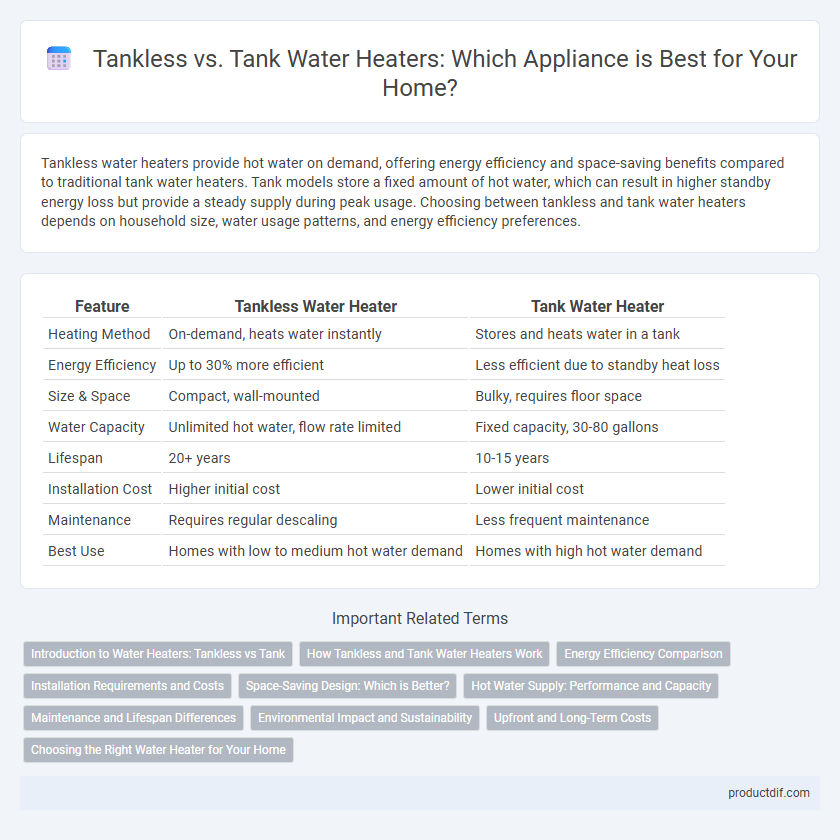Tankless water heaters provide hot water on demand, offering energy efficiency and space-saving benefits compared to traditional tank water heaters. Tank models store a fixed amount of hot water, which can result in higher standby energy loss but provide a steady supply during peak usage. Choosing between tankless and tank water heaters depends on household size, water usage patterns, and energy efficiency preferences.
Table of Comparison
| Feature | Tankless Water Heater | Tank Water Heater |
|---|---|---|
| Heating Method | On-demand, heats water instantly | Stores and heats water in a tank |
| Energy Efficiency | Up to 30% more efficient | Less efficient due to standby heat loss |
| Size & Space | Compact, wall-mounted | Bulky, requires floor space |
| Water Capacity | Unlimited hot water, flow rate limited | Fixed capacity, 30-80 gallons |
| Lifespan | 20+ years | 10-15 years |
| Installation Cost | Higher initial cost | Lower initial cost |
| Maintenance | Requires regular descaling | Less frequent maintenance |
| Best Use | Homes with low to medium hot water demand | Homes with high hot water demand |
Introduction to Water Heaters: Tankless vs Tank
Water heaters come in two primary types: tankless and tank systems, each offering distinct advantages for household water heating needs. Tank water heaters store and heat a fixed volume of water, providing a constant supply but consuming more space and energy over time. Tankless water heaters deliver hot water on demand, improving energy efficiency and saving space by eliminating the need for a storage tank.
How Tankless and Tank Water Heaters Work
Tank water heaters store and heat a large volume of water in an insulated tank, maintaining it at a preset temperature for immediate use. Tankless water heaters, also known as on-demand heaters, heat water directly as it flows through the unit using electric coils or gas burners, eliminating the need for a storage tank. This difference in operation results in tankless heaters providing continuous hot water without standby heat loss, while tank heaters offer a steady supply limited by tank capacity.
Energy Efficiency Comparison
Tankless water heaters offer superior energy efficiency by heating water on demand, eliminating standby heat loss common in traditional tank water heaters, which continuously maintain water temperature. Studies show tankless models can reduce energy consumption by up to 30% compared to tank systems, translating to lower utility bills and reduced carbon footprint. Choosing a tankless system also aligns with energy-saving certifications such as ENERGY STAR, promoting sustainable household energy use.
Installation Requirements and Costs
Tankless water heaters require professional installation of specialized gas lines or electrical circuits, often resulting in higher upfront labor costs compared to traditional tank water heaters. Tank water heaters have simpler installation processes with standard plumbing and venting, making them more cost-effective initially. Long-term savings with tankless models arise from energy efficiency, but installation complexity and expenses remain significant factors in decision-making.
Space-Saving Design: Which is Better?
Tankless water heaters offer a compact, wall-mounted design that saves floor space, making them ideal for small homes or apartments. Traditional tank water heaters require significant floor area for installation, limiting usable space in utility rooms. For homeowners prioritizing space-saving solutions, tankless units provide a more efficient footprint without sacrificing water heating capacity.
Hot Water Supply: Performance and Capacity
Tankless water heaters provide hot water on demand with an unlimited supply, ensuring consistent temperature without the wait associated with storage tanks. Traditional tank water heaters store a fixed volume of heated water, which may run out during high usage, causing delays while the tank reheats. Performance in tankless models is ideal for households with variable water needs, while tank systems better suit steady, predictable consumption patterns.
Maintenance and Lifespan Differences
Tankless water heaters require less frequent maintenance due to their compact design and lack of a storage tank, reducing sediment buildup and corrosion risks. Conventional tank water heaters demand regular flushing to prevent sediment accumulation and pressure issues, impacting their efficiency and longevity. Tankless units generally have a lifespan of 20+ years, surpassing tank heaters which typically last 10-15 years with proper maintenance.
Environmental Impact and Sustainability
Tankless water heaters reduce environmental impact by consuming up to 30% less energy compared to traditional tank models, lowering greenhouse gas emissions over their lifespan. Their on-demand heating system eliminates standby energy loss, contributing to more sustainable energy use and decreased water waste through instant hot water delivery. Choosing tankless units aligns with eco-friendly practices, supporting long-term resource conservation and reduced carbon footprint.
Upfront and Long-Term Costs
Tankless water heaters typically have higher upfront costs ranging from $1,000 to $3,000, including installation, compared to traditional tank models, which cost between $400 and $1,500. Over the long term, tankless systems offer energy savings of 24% to 34% by heating water on demand, reducing utility bills and lowering maintenance expenses. Traditional tank heaters incur higher operational costs due to standby heat loss and shorter lifespans averaging 10 to 15 years, while tankless units can last over 20 years with proper care.
Choosing the Right Water Heater for Your Home
Selecting the right water heater depends on your household's hot water demand, energy efficiency goals, and available space. Tankless water heaters offer on-demand hot water with lower energy consumption and a compact design, ideal for homes with limited space. Traditional tank water heaters provide a steady supply of hot water and are often more cost-effective upfront but consume more energy due to standby heat loss.
Tankless vs Tank water heater Infographic

 productdif.com
productdif.com